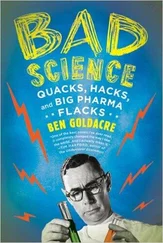Ben Goldacre - Bad Science
Здесь есть возможность читать онлайн «Ben Goldacre - Bad Science» — ознакомительный отрывок электронной книги совершенно бесплатно, а после прочтения отрывка купить полную версию. В некоторых случаях можно слушать аудио, скачать через торрент в формате fb2 и присутствует краткое содержание. Жанр: Публицистика, на английском языке. Описание произведения, (предисловие) а так же отзывы посетителей доступны на портале библиотеки ЛибКат.
- Название:Bad Science
- Автор:
- Жанр:
- Год:неизвестен
- ISBN:нет данных
- Рейтинг книги:5 / 5. Голосов: 1
-
Избранное:Добавить в избранное
- Отзывы:
-
Ваша оценка:
- 100
- 1
- 2
- 3
- 4
- 5
Bad Science: краткое содержание, описание и аннотация
Предлагаем к чтению аннотацию, описание, краткое содержание или предисловие (зависит от того, что написал сам автор книги «Bad Science»). Если вы не нашли необходимую информацию о книге — напишите в комментариях, мы постараемся отыскать её.
Bad Science — читать онлайн ознакомительный отрывок
Ниже представлен текст книги, разбитый по страницам. Система сохранения места последней прочитанной страницы, позволяет с удобством читать онлайн бесплатно книгу «Bad Science», без необходимости каждый раз заново искать на чём Вы остановились. Поставьте закладку, и сможете в любой момент перейти на страницу, на которой закончили чтение.
Интервал:
Закладка:
Just as the causes of these scares have been more emotional than anything else, so too has much of the harm. Parents of children with autism have been racked with guilt, doubt and endless self-recrimination over the thought that they themselves are responsible for inflicting harm upon their own child. This distress has been demonstrated in countless studies: but so close to the end, I don’t want to introduce any more research papers.
There is one quote that I find – although she would perhaps complain about my using it – both moving and upsetting. It’s from Karen Prosser, who featured with her autistic son Ryan in the Andrew Wakefield video news release from the Royal Free Hospital in 1998. ‘Any mother who has a child wants it to be normal,’ she says. ‘To then find out your child might be genetically autistic is tragic. To find out that it was caused by a vaccine, that you agreed to have done … is just devastating.’
Disdain for statistics in healthcare research wasn’t unusual at the time: Ignaz Semmelweis noticed in 1847 that patients were dying much more frequently on the obstetrics ward run by the medical students than on the one run by the midwifery students (this was in the days when students did all the legwork in hospitals). He was pretty sure that this was because the medical students were carrying something nasty from the corpses in the dissection room, so he instituted proper handwashing practices with chlorinated lime, and did some figures on the benefits. The death rates fell, but in an era of medicine that championed ‘theory’ over real-world empirical evidence, he was basically ignored, until Louis Pasteur came along and confirmed the germ theory. Semmelweis died alone in an asylum. You’ve heard of Pasteur.
Here is Jack on cramp: ‘For years many people have suffered with cramp. By dowsing, I discovered that this is due to the fact that the body is not absorbing the element “scandium” which is linked to and controls the absorption of magnesium phosphate.’ And on general health complaints: ‘Based on my expertise in dowsing, I noted that many of my patients were suffering from severe deficiencies of carbon in their systems. The ease in which people these days suffer hairline fractures and broken bones is glaringly apparent to the eyes that are trained to see.’
Whether you buy the DoH phrase ‘MMR is safe’ depends on what you decide you mean by ‘safe’. Is flying safe? Is your washing machine safe? What are you sitting on? Is that safe? You can obsess over the idea that philosophically nothing can ever be shown to be 100 per cent safe – and many will – but you would be arguing about a fairly meaningless and uncommon definition of the word.
‘The groups of investigators that either had access to original autism specimens or investigated them later for measles virus detection were invited to take part in the study but failed to respond. Similarly, it was not possible to obtain clinical specimens of autism cases from these investigators for independent investigations.’
In 2008, just as this chapter was being put to bed, some journalists deigned – miraculously – to cover a PCR experiment with a negative finding. It was misreported as the definitive refutation of the entire MMR–autism hypothesis. This was a childish overstatement, and that doesn’t help anyone either. I am not hard to please.
Not 11.7 per cent as claimed in the Telegraph and the Daily Mail in February and June 2006.
AND ANOTHER THING
I could go on. As I write this in May 2008, the media are still pushing a celebrity-endorsed ‘miracle cure’ (and I quote) for dyslexia, invented by a millionaire paint entrepreneur, despite the abysmal evidence to support it, and despite customers being at risk of simply losing their money anyway, because the company seems to be going into administration; the newspapers are filled with an amazing story about a finger that ‘grew back’ through the use of special sciencey ‘pixie dust’ (I quote again), although the claim has been around for three years, unpublished in any academic journal, and severed fingertips grow back by themselves anyway; more ‘hidden data’ scandals are exposed from the vaults of big pharma every month; quacks and cranks continue to parade themselves on television quoting fantastical studies to universal approbation; and there will always be new scares, because they sell so very well, and they make journalists feel alive.
To anyone who feels their ideas have been challenged by this book, or who has been made angry by it – to the people who feature in it, I suppose – I would say this: You win. You really do. I would hope there might be room for you to reconsider, to change your stance in the light of what might be new information (as I will happily do, if there is ever an opportunity to update this book). But you will not need to, because, as we both know, you collectively have almost full-spectrum dominance: your own slots in every newspaper and magazine in Britain, and front-page coverage for your scare stories. You affect outsider swagger, bizarrely, from the sofas of daytime television. Your ideas – bogus though they may be – have immense superficial plausibility, they can be expressed rapidly, they are endlessly repeated, and they are believed by enough people for you to make very comfortable livings, and to have enormous cultural influence. You win.
It’s not the spectacular individual stories that are the problem, so much as the constant daily grind of stupid little ones. This will not end, and so I will now abuse my position by telling you, very briefly, exactly what I think is wrong, and some of what can be done to fix it.
The process of obtaining and interpreting evidence isn’t taught in schools, nor are the basics of evidence-based medicine and epidemiology, yet these are obviously the scientific issues which are most on people’s minds. This is not idle speculation. You will remember that this book began by noticing that there has never been an exhibit on evidence-based medicine in London’s Science Museum.
A five-decade survey of post-war science coverage in the UK by the same institution shows – and this is officially the last piece of data in the book – that in the 1950s science reporting was about engineering and inventions, but by the 1990s everything had changed. Science coverage now tends to come from the world of medicine, and the stories are of what will kill you, or save you. Perhaps it is narcissism, or fear, but the science of health is important to people, and at the very time when we need it the most, our ability to think around the issue is being energetically distorted by the media, corporate lobbies and, frankly, cranks.
Without anybody noticing, bullshit has become an extremely important public health issue, and for reasons that go far beyond the obvious hysteria around immediate harms: the odd measles tragedy, or a homeopath’s unnecessary malaria case. Doctors today are keen – as it said in our medical school notes – to work ‘collaboratively with the patient towards an optimum health outcome’. They discuss evidence with their patients, so that they can make their own decisions about treatments.
I don’t generally talk or write about being a doctor – it’s mawkish and tedious, and I’ve no desire to preach from authority – but working in the NHS you meet patients from every conceivable walk of life, in huge numbers, discussing some of the most important issues in their lives. This has consistently taught me one thing: people aren’t stupid. Anybody can understand anything, as long as it is clearly explained – but more than that, if they are sufficiently interested. What determines an audience’s understanding is not so much scientific knowledge, but motivation: patients who are ill, with an important decision to make about treatment, can be very motivated indeed.
Читать дальшеИнтервал:
Закладка:
Похожие книги на «Bad Science»
Представляем Вашему вниманию похожие книги на «Bad Science» списком для выбора. Мы отобрали схожую по названию и смыслу литературу в надежде предоставить читателям больше вариантов отыскать новые, интересные, ещё непрочитанные произведения.
Обсуждение, отзывы о книге «Bad Science» и просто собственные мнения читателей. Оставьте ваши комментарии, напишите, что Вы думаете о произведении, его смысле или главных героях. Укажите что конкретно понравилось, а что нет, и почему Вы так считаете.





![Роман Зыков - Роман с Data Science. Как монетизировать большие данные [litres]](/books/438007/roman-zykov-roman-s-data-science-kak-monetizirova-thumb.webp)






